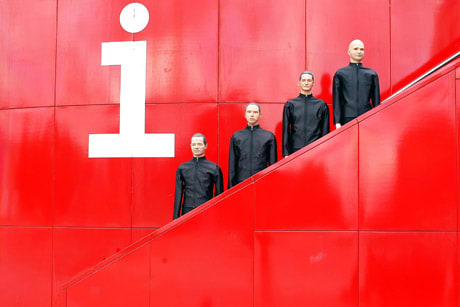Long in the works, the hotly anticipated eight-disc Kraftwerk box set gathers the most renowned output to come out of the group's King Klang studios, and although it's not as comprehensive an overview of the electronic pop pioneers as some long-time fans would like, 12345678: The Catalogue is nevertheless an impressive testament to a life's work. The Catalogue remasters and reupholsters eight Kraftwerk releases, including 1974's Autobahn, 1975's Radio-Activity, 1977's Trans-Europe Express, 1979's The Man-Machine, 1981's Computer World, 1986's Techno Pop, 1991's The Mix (a remix collection) and 2003's Tour De France. The set features the group's most fertile period, from 1974 to 1979, the years in which Kraftwerk developed their iconic portrait of electronic austerity and futuristic theatricality. Those four albums are essential electronic pop listening, providing a perfect opportunity to rediscover the evolution of these young avant-garde artists moulding the electronic sound and presentation that would fulfil the legendary Kraftwerk package. From 1981 to 2003, however, the group only released new material sporadically, perhaps aware that their musical evolution was waning in the face of a new generation taking the Kraftwerk influence further and the technological mainstreaming of their electronic impulses. Sadly missing here are the recordings from the gestational late '60s/early '70s phase of the band, recordings long out-of-print that would have illuminated the development of Kraftwerk as a more humane creative force, as opposed to merely reinforcing the myth we already know.
What was it like when Kraftwerk first started?
Ralf Hutter: You can imagine when we started, we were outsiders, even though there was this awakening in film, in literature, in art. On the musical side, we came in, and in the late '60s, we performed, or we played music, at art gallery parties. There was a scene around the Zodiac [a series of events hosted by Cluster members in Berlin], and a parallel scene was happening in Düsseldorf and a little bit in Cologne. Here in Düsseldorf, nearly every weekend we were at some kind of art party or open student parties. We didn't start in the rock circuit; we were more about playing sounds at art events.
What do you do with all the old machinery at Kling Klang studios?
We keep one operative model of all the instruments we've used. So we have in our archive an old Kling Klang museum going through the times that we would want to recreate. Let's say we want a sound from the Autobahn period, then we would use a mini-moog from that period. They're all restored, in perfect condition. But we don't use the instruments themselves so much; we've more transformed them into soft synths.
(EMI)What was it like when Kraftwerk first started?
Ralf Hutter: You can imagine when we started, we were outsiders, even though there was this awakening in film, in literature, in art. On the musical side, we came in, and in the late '60s, we performed, or we played music, at art gallery parties. There was a scene around the Zodiac [a series of events hosted by Cluster members in Berlin], and a parallel scene was happening in Düsseldorf and a little bit in Cologne. Here in Düsseldorf, nearly every weekend we were at some kind of art party or open student parties. We didn't start in the rock circuit; we were more about playing sounds at art events.
What do you do with all the old machinery at Kling Klang studios?
We keep one operative model of all the instruments we've used. So we have in our archive an old Kling Klang museum going through the times that we would want to recreate. Let's say we want a sound from the Autobahn period, then we would use a mini-moog from that period. They're all restored, in perfect condition. But we don't use the instruments themselves so much; we've more transformed them into soft synths.
